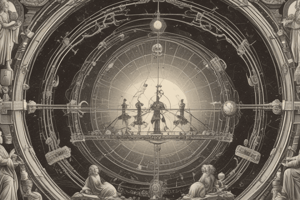Podcast
Questions and Answers
Which thinker is known for the discovery of the circulation of blood?
Which thinker is known for the discovery of the circulation of blood?
- Giordano Bruno
- Andreas Vesalius
- William Harvey (correct)
- Antonie van Leeuwenhoek
Who was executed for heresy due to advocating heliocentric views?
Who was executed for heresy due to advocating heliocentric views?
- Paracelsus
- Tycho Brahe
- Robert Boyle
- Giordano Bruno (correct)
Which scientist is credited with founding microbiology?
Which scientist is credited with founding microbiology?
- Antonie van Leeuwenhoek (correct)
- William Harvey
- Robert Boyle
- Tycho Brahe
Who rejected the heliocentric model and supported a geocentric universe?
Who rejected the heliocentric model and supported a geocentric universe?
What is Robert Boyle best known for in the field of chemistry?
What is Robert Boyle best known for in the field of chemistry?
Which thinker promoted a radical approach to treating illness rather than traditional remedies?
Which thinker promoted a radical approach to treating illness rather than traditional remedies?
Which figure is noted for detailed anatomical illustrations but later became a personal physician to a king?
Which figure is noted for detailed anatomical illustrations but later became a personal physician to a king?
Which scientist believed in atoms and conducted advanced experiments to study gas behaviors?
Which scientist believed in atoms and conducted advanced experiments to study gas behaviors?
Which of the following statements accurately describes one of Johannes Kepler's contributions to astronomy?
Which of the following statements accurately describes one of Johannes Kepler's contributions to astronomy?
What was a significant impact of Nicolaus Copernicus's findings on astronomy?
What was a significant impact of Nicolaus Copernicus's findings on astronomy?
Which philosophical approach did Francis Bacon advocate for in scientific study?
Which philosophical approach did Francis Bacon advocate for in scientific study?
Which of the following statements about Galileo Galilei is true?
Which of the following statements about Galileo Galilei is true?
What was the primary focus of René Descartes in his philosophical work?
What was the primary focus of René Descartes in his philosophical work?
Which of Isaac Newton's laws states that an object in motion will remain in motion unless acted upon by an external force?
Which of Isaac Newton's laws states that an object in motion will remain in motion unless acted upon by an external force?
Which of the following accurately describes the heliocentric model advocated by Galileo?
Which of the following accurately describes the heliocentric model advocated by Galileo?
Which of the following statements regarding the Laws of Planetary Motion is NOT true?
Which of the following statements regarding the Laws of Planetary Motion is NOT true?
Flashcards are hidden until you start studying
Study Notes
Overview of the Scientific Revolution
- Marked the emergence of modern science during the early modern period.
- Key developments in mathematics, physics, astronomy, biology, and chemistry.
- Transformed societal views about nature.
- Spanned from Copernicus to Newton.
Key Thinkers in the Scientific Revolution
-
Andreas Vesalius (1514–1564)
- Dissected corpses and produced detailed human anatomy illustrations.
- Became personal doctor to Charles V after losing interest in dissections.
-
Giordano Bruno (1548–1600
- Italian monk who supported the heliocentric model.
- Executed for heresy by Catholic authorities.
-
Antonie van Leeuwenhoek (1632–1723)
- Known as the "Father of Microbiology."
- Discovered bacteria with a microscope; referred to them as “animalcules."
-
William Harvey (1578–1657)
- Investigated the heart, discovering its function as a pump.
- Studied blood circulation and valves.
-
Robert Boyle (1627–1691)
- Recognized as the "Father of Modern Chemistry."
- Developed Boyle’s Gas Law regarding gas pressure and volume; supported atomic theory.
-
Paracelsus (1493–1541)
- Challenged traditional medical practices based on humors.
- Advocated for chemical causes of illnesses and connected science to spirituality.
-
Tycho Brahe (1546–1601)
- Promoted a geocentric model but conducted extensive observations for 20 years.
- Constructed a laboratory in Denmark, analyzing star movements.
-
Johannes Kepler (1571–1630)
- Assistant to Brahe; confirmed heliocentric theory using his master’s data.
- Formulated the three Laws of Planetary Motion, including elliptical orbits.
-
Nicolaus Copernicus (1473–1543)
- First to propose that Earth revolves around the sun.
- Delayed publication of findings until close to his death, initiating the Copernican Revolution.
-
Francis Bacon (1561–1626)
- Advocated for empirical observation over authority in forming beliefs.
- Promoted the empirical method and inductive reasoning.
-
Galileo Galilei (1564–1642)
- Advanced experimental physics and observational astronomy, revealing planetary imperfections.
- Faced Inquisition for supporting the heliocentric model and was forced to renounce his findings.
-
René Descartes (1596–1650)
- Mathematician and philosopher; contributed to deductive reasoning.
- Famous for the quote "I think, therefore I am," emphasizing the importance of doubt and proof.
-
Isaac Newton (1642–1726)
- Developed calculus and established the three Laws of Motion.
- Introduced principles of inertia, force, and action-reaction; transformed physics and mathematics.
Studying That Suits You
Use AI to generate personalized quizzes and flashcards to suit your learning preferences.




